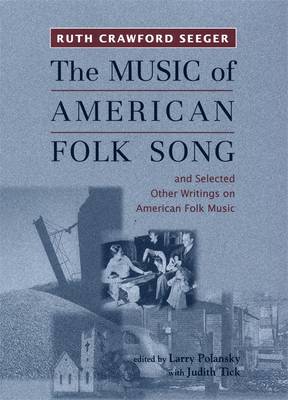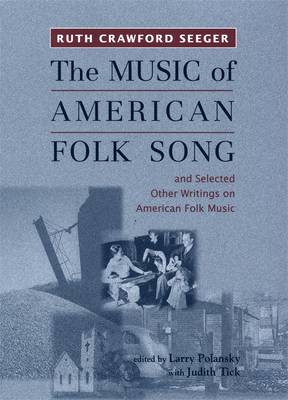
Je cadeautjes zeker op tijd in huis hebben voor de feestdagen? Kom langs in onze winkels en vind het perfecte geschenk!
- Afhalen na 1 uur in een winkel met voorraad
- Gratis thuislevering in België vanaf € 30
- Ruim aanbod met 7 miljoen producten
Je cadeautjes zeker op tijd in huis hebben voor de feestdagen? Kom langs in onze winkels en vind het perfecte geschenk!
- Afhalen na 1 uur in een winkel met voorraad
- Gratis thuislevering in België vanaf € 30
- Ruim aanbod met 7 miljoen producten
Zoeken
The Music of American Folk Song
And Selected Other Writings on American Folk Music
Ruth Crawford Seeger
€ 56,95
+ 113 punten
Omschrijving
This is the first publication of an annotated monograph by the noted composer and folksong scholar Ruth Crawford Seeger. Originally written as a foreword for the 1940 book Our Singing Country, it was considered too long and was replaced by a much shorter version. According to her stepson, Pete Seeger, when the original was not included "Ruth suffered one of the biggest disappointments of the last ten years of her life. It just killed her . . . She was trying to analyze the whole style and problem of performing this music." Along with her children Mike and Peggy Seeger, he has long desired to see this work in print as it was meant to be read. The manuscript has been edited from several varying sources by Larry Polansky, with the assistance of Seeger's biographer Judith Tick. It is divided into two sections: I. "A Note on Transcription" and II. "Notes on the Songs and on Manners of Singing." Seeger examines all aspects of the relationship between singer, song, notation, the eventual performer, and the transcriber. In Section I, Seeger develops a complex and well-organized system of notation for these songs which is meant to be both descritive (transcription as cultural preservation) and prescriptive (she intended that others would be able to perform these songs). In Section II, she provides an interpretive theory for performance of this music, and suggests how performers might make the songs "their own" through a deep knowledge of the original styles. Ruth Crawford Seeger considered this work to be both a major accomplishment and a central statement of herown ideas on the topic. Larry Polansky is Associate Professor of Music at Dartmouth College, and a well-known composer and theorist on American music. Judith Tick is Professor of Music at Northeastern University and author of the first major biography of Ruth Crawford Seeger.
Specificaties
Betrokkenen
- Auteur(s):
- Uitgeverij:
Inhoud
- Aantal bladzijden:
- 212
- Taal:
- Engels
- Reeks:
- Reeksnummer:
- nr. 17
Eigenschappen
- Productcode (EAN):
- 9781580461368
- Verschijningsdatum:
- 15/05/2003
- Uitvoering:
- Paperback
- Formaat:
- Trade paperback (VS)
- Afmetingen:
- 161 mm x 227 mm
- Gewicht:
- 358 g

Alleen bij Standaard Boekhandel
+ 113 punten op je klantenkaart van Standaard Boekhandel
Beoordelingen
We publiceren alleen reviews die voldoen aan de voorwaarden voor reviews. Bekijk onze voorwaarden voor reviews.









